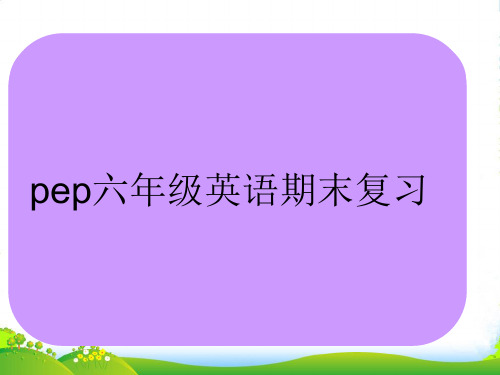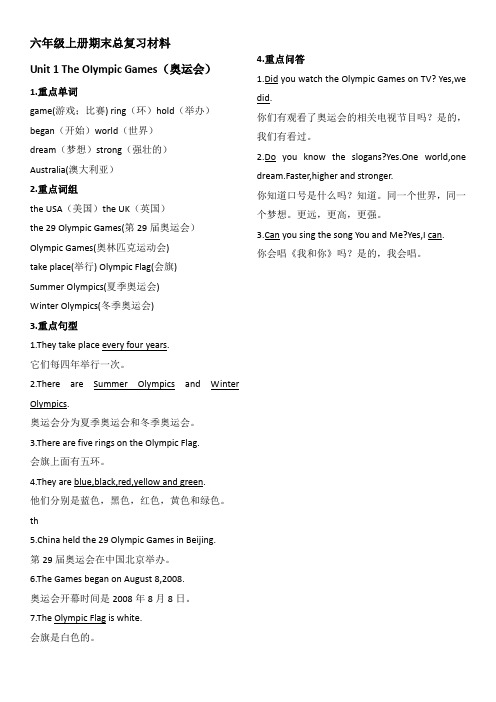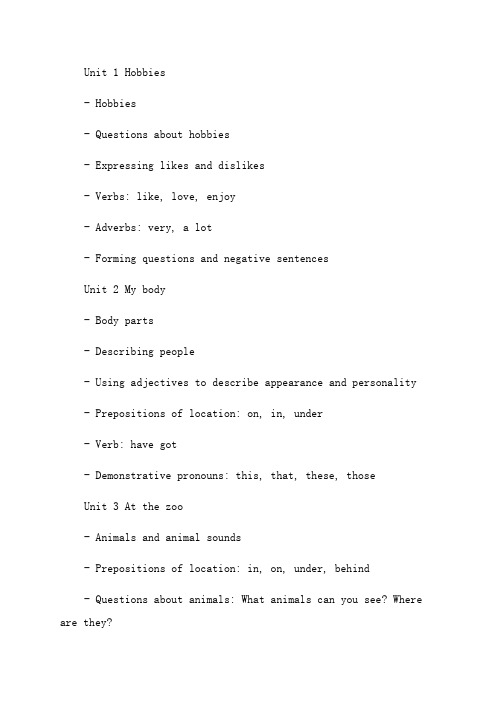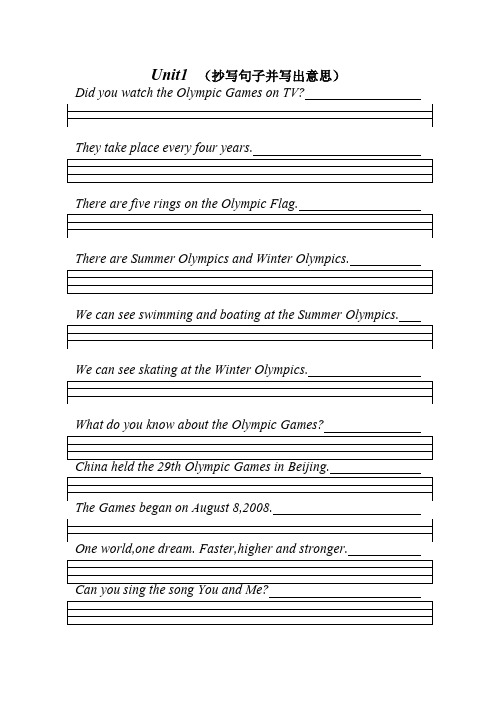六年级英语上册期末总复习
期末复习(讲义)译林版英语六年级上册

六年级上册期末复习一、时态复习1.一般现在时定义:经常发生的动作或现在的状态结构:主语+be/主语+动词注意:第三人称单数be动词用is,动词+s/es否定:主语+be+not 或主语+don't/doesn’t+doShe is=She’s He is=He’s I am=I’m We are=We’reis not=isn't are not=aren't am not不能缩写一般疑问句:①有be动词的情况下将be动词提前②动词用助动词do/does提问注意:改为一般疑问句时,第一人称要改为第二人称时间状语:never、seldom、sometimes、usually、often、always例:①My mother often goes shopping.→改为否定句:My mother often doesn't go shopping.→改为一般疑问句:Does your mother often go shopping?②I get up at 7 o'clock every day.→改为否定句:I don't get up at 7 o'clock every day.→改为一般疑问句:Do you get up at 7 o'clock every day?③Millie is a student.→改为否定句:Millie isn't a student.→改为一般疑问句:is Millie a student?2.现在进行时定义:现在正在做或正在发生的动作结构:is/am/are+doing否定:isn't/aren’t/am not+doing时间状语:Look!Listen!now、There be...over there、where is/are sb.?例:③Look!The girl is dancing.→改为否定句:Look!The girl isn’t dancing.②——Where’s mom, Dad?——Maybe she is cooking dinner in the kitchen.3.一般过去时定义:过去某个时间点发生的动作结构:主语+was/were 或主语+动词过去式否定:主语+was not/were not=主语+wasn't/weren’t 或主语+didn't+do 一般疑问句:①有be动词的情况下将be动词提前②动词用助动词did提问注意:改为一般疑问句时,第一人称要改为第二人称时间状语:yesterday、last...、just now、...ago例:③I was ill yesterday.→改为否定句:I wasn't ill yesterday.→改为一般疑问句:Were you ill yesterday?②He went to zoo with his parents last weekend.→改为否定句:He didn't go to zoo with his parents last weekend.→改为一般疑问句:Did he go to zoo with his parents last weekend?4.一般将来时定义:将来的计划或者打算结构:主语+is/am/are going to be或主语+is/am/are going to do否定:isn’t/aren’t/am not going to一般疑问句:be动词直接提前注意:改为一般疑问句时,第一人称要改为第二人称时间状语:next...、tomorrow例:①It is going to be Chinese New Year next week.→改为否定句:It isn’t going to be Chinese New Year next week.→改为一般疑问句:Is it going to be Chinese New Year next week?②I’m going to visit my grandparents tomorrow.→改为否定句:I’m not going to visit my grandparents tomorrow.→改为一般疑问句:Are you going to visit my grandparents tomorrow?二、易错点复习1.询问天气的两种句型:③what is/was the weather like?③How is/was the weather?2.There be句型③就近原则:be动词由后面的第一个名词决定③there be句型不能与have、has、had连用③there be +sb./sth.(即名词或代词)例:There is rain today.=It is rainy today.3.乘坐公共交通③take the/a bus to...=go to ...by bus=go to... on the bus4.home前面不加任何介词例:walk home drive home take a bus home5.will和shall的区别will表示将要,shall表示建议,shall一般用于疑问句表示提议,主语通常是we。
人教版(PEP)六年级英语上册期末总复习课件

1、What are you going to do?你想做什么?询问他人在未来的 打算。be going to 后面要跟动词的原形。注意be going to be 意思是 “打算成为什么,干什么职业。” 注意一下句子的区别,找出正确回答。 What are you going to do this afternoon? I am going to 加 做事的词组
pep六年级英语期末复习
重点词汇 science museum post office bookstore cinema hospital crossing turn left go straight turn right 重点句型 Where is the museum shop?
It’s near the door.
3 We’re going to draw some pictures in Renmin Park. 我们要到人民公园去画画。 4、 I’m going to see a film. 我打算去看电影。
5、 I’m going to visit my grandparents. 我打算去看望外 祖父母。
How are you going?I am going to 加交通方式的词组
Who are you going with? I am going to 加某人
部分疑问代词的意义与用法:
(1)What 什么。用来问是什么,做什么,叫什么,什么样等 等。如:What is your name? 你的名字叫什么? What is your father? 你爸爸是干什么的? What is your hobby?你的爱好是什么?What is your favourite food?你最喜爱的食物是什么? What’s your math teacher like? 你的数学老师长得什么样子? (2)Where , 在哪里,到哪里。用来问地点。
人教版(PEP)六年级英语上册期末复习知识点

人教版(PEP)六年级英语上册期末复习知识点人教版(PEP)六年级英语上册复习知识点Unit 1 How can I get there?主要单词:science科学museum博物馆post office邮局bookstore书店cinema电影院hospital医院crossing十字路口turn转弯left 向左ask问interesting有趣的Italian意大利restaurant餐馆pizza 比萨饼street大街;街道get到达GPS全球卫星定位系统feature特点follow跟着far较远的tell告诉习惯搭配turn left向左转turn right向右转go straight直行in front of...在...前面next to挨着go straight直走near the park在公园附近on Dongfang Street在东方大街上post office邮局pet hospital 宠物医院Beihai Park北海公园Italian restaurant意大利餐馆Palace Museum故宫博物院science museum科学博物馆主要句子:☆1、☆Where is the museum shop?博物馆的市肆在哪儿?☆☆2、It’s near the door.在大门附近。
☆☆3、How can we get there?我们怎么到那儿?☆☆4、Turn left at the bookstore.在书店左转。
☆5、I want to buy a postcard.我想买一张明片。
6、I’ll ask.我去问问。
7、Wow, a talking robot!哇!一个讲话机器人。
8、What a great museum!好棒的一家博物馆!10、There is a pet hospital in my city.在我的城市有一家宠物医院。
11、Wu Yifan and Robin are looking at some robots.吴一凡和罗宾正在看一些机器人。
闽教版小学英语六年级上册期末总复习材料

六年级上册期末总复习材料Unit 1 The Olympic Games(奥运会)1.重点单词game(游戏;比赛) ring(环)hold(举办)began(开始)world(世界)dream(梦想)strong(强壮的)Australia(澳大利亚)2.重点词组the USA(美国)the UK(英国)the 29 Olympic Games(第29届奥运会)Olympic Games(奥林匹克运动会)take place(举行) Olympic Flag(会旗)Summer Olympics(夏季奥运会)Winter Olympics(冬季奥运会)3.重点句型1.They take place every four years.它们每四年举行一次。
2.There are Summer Olympics and Winter Olympics.奥运会分为夏季奥运会和冬季奥运会。
3.There are five rings on the Olympic Flag.会旗上面有五环。
4.They are blue,black,red,yellow and green.他们分别是蓝色,黑色,红色,黄色和绿色。
th5.China held the 29 Olympic Games in Beijing.第29届奥运会在中国北京举办。
6.The Games began on August 8,2008.奥运会开幕时间是2008年8月8日。
7.The Olympic Flag is white.会旗是白色的。
4.重点问答1.Did you watch the Olympic Games on TV? Yes,we did.你们有观看了奥运会的相关电视节目吗?是的,我们有看过。
2.Do you know the slogans?Yes.One world,one dream.Faster,higher and stronger.你知道口号是什么吗?知道。
人教(PEP)六年级上册英语期末复习(共23张PPT)

A. a, of
B. an, in
C. an, from
(C) 3. —Does Zhang Peng like dancing?
— _________ He likes playing basketball.
A. Yes, he can.
B. Yes, he does. C. No, he doesn’t.
factory worker
businessman
postman
police officer
Review
Unit5
Where does he/she work? How does he/she go to work?
fisherman
pilot
scientist
coach
Review
Unit5
( A ) 1. My mother works in a factory. She is a ________.
—This morning. A. Where
B. What
C. When 答案
Review
Unit4
—What are your hobbies? —I like …
Review
Unit4
—Does he/she …?
—Yes, he/she does./No, he/she doesn’t.
A. worker
B. watch
C. dancer
( A ) 2. He catches fish. He is a ________.
A. fisherman
B. teacher
C. fishermen
( B ) 3. —What do you do? —________
六年级英语上册期末复习资料

Unit 1 Hobbies- Hobbies- Questions about hobbies- Expressing likes and dislikes- Verbs: like, love, enjoy- Adverbs: very, a lot- Forming questions and negative sentencesUnit 2 My body- Body parts- Describing people- Using adjectives to describe appearance and personality - Prepositions of location: on, in, under- Verb: have got- Demonstrative pronouns: this, that, these, thoseUnit 3 At the zoo- Animals and animal sounds- Prepositions of location: in, on, under, behind- Questions about animals: What animals can you see? Where are they?- Adjectives: big, small, tall, short, long, thin, fat- Singular and plural nouns- Affirmative and negative sentencesUnit 4 At school- School subjects- Classroom objects- Actions: read, write, draw, play, sing, dance, swim, run - Expressing ability: Can you…? Yes, I can. / No, I can’t.- Expressing permission: Can I…? Yes, you can. / No, you can’t.- Ordinal numbers: first, second, third, etc.Unit 5 My house- Rooms in a house- Furniture and household objects- Prepositions of location: in, on, under, behind, next to, in front of- Questions about rooms and furniture: Is there a…? Are there any…?- There is / There are- Adjectives: big, small, old, new, clean, dirtyUnit 6 At the park- Activities at the park: walk, run, play, ride, climb, swing, slide- Prepositions of location: in, on, under, behind, in front of, next to- Questions about activities: What can you do at the park? Where can you…?- Expressing preferences: I prefer… / I don’t like…Unit 7 In the mountains- Geographical features: mountain, river, lake, valley- Activities in the mountains: hike, climb, swim, fish, take photos- Prepositions of location: in, on, under, behind, in front of, next to- Questions about activities: What can you do in the mountains? Where can you…?- Verb: can- Expressing preferences: I prefer… / I don’t like…Unit 8 In Beijing- Places in Beijing: the Great Wall, the Forbidden City, Tiananmen Square- Activities in Beijing: visit, walk, take photos, climb, buy souvenirs- Prepositions of location: in, on, under, behind, in front of, next to- Questions about places and activities: What can you do in Beijing? Where can you…?- Modal verb: can- Expressing preferences: I prefer… / I don’t like…Unit 9 Food and drinks- Food and drinks- Expressing likes and dislikes about food and drinks- Countable and uncountable nouns- Quantifiers: a glass of, a cup of, a bowl of, some- Adjectives: hot, cold, sweet, salty, sour, delicious, tastyUnit 10 Favourite sports- Sport names- Expressing likes and dislikes about sports- Sports equipment- Questions about sports: What sports do you like? What sports can you play?- Verbs: play, do- Expressing abilities: I can… / I can’t…Unit 11 Time for fun- Months and seasons- Expressing likes and dislikes about activities in different seasons- Ordinal numbers: first, second, third, etc.- Adjectives: sunny, cloudy, rainy, snowy, cold, hot, warm, cool- Present simple tense: I read/write/draw…Unit 12 Holidays- Holidays and holiday activities- Questions about holidays: What holiday is in…? What can you do during…?- Adjectives: long, short, fun, boring, interesting- Expressing future plans: I am going to… I will…- Expressing preferences: I prefer… / I don’t like…总结:这个提纲包含了人教版六年级上册所有的重点内容,可以帮助学生复习整个上学期所学的知识点。
教育部审定小学英语六年级上册期末总复习材料抄写单词

Did you watch the Olympic Games on TV?They take place every four years.There are five rings on the Olympic Flag.There are Summer Olympics and Winter Olympics.We can see swimming and boating at the Summer Olympics.We can see skating at the Winter Olympics.What do you know about the Olympic Games?China held the 29th Olympic Games in Beijing.The Games began on August 8,2008.One world,one dream. Faster,higher and stronger.Can you sing the song You and Me?Who’s that boy between the two women? He looks strong and healthy.Does he exercise every day?He always gets up early in the morning. Does he often play basketball?He always goes running in the morning. Does he often do high jump.Wang Tao is passing the ball to Peter. Some girls are cheering for their class team. Grandma is sitting between Ben and Sally. They are boating with their father.They are cheering for their class team.Do you often exercise?It’s bad for your teeth.m going to pick some vegetables.They keep your body healthy.Bring me a basket,please.Bring me a glass of water.m very thirsty.Take an umbrella with you.We need vegetables and fruits to keep healthy. What do you usually have for lunch?I usually have rice,fish and vegetables.Can I help you,madam?My daughter wants a dress.My son wants a pair of shorts.Can I try it on?She looks beautiful in her new dress.Girls can wear shorts,trousers,and T-shirts like boys.Boys can’t wear skirts or dresses like girls.Put them in the washing machine.s.t know.s.s.I make my bed every morning.I often water the flowers.I clean my room erery week.I clean the table after dinner.I wash my clothes.Wash my clothes water the flowers water the plantsHe usually gets up at half past six.He got up at half past seven.He usually walks to school.He usually gets to school at seven twenty.clock.At half past eleven. Why did you go to bed so late?I watched a football game on TV.What did you do last night?did some shopping at the supermarket.watched a film at the cinema.played the violin in my bedroom.watched a football game at home.What’s the date today?Can I invite my friends to dinner?It’s November 17.The fourth Thursday of November.How do you spend it?We have a big family dinner.We also invite friends to join us.Please help yourselves to the food.Would you like some soup,Miss Gao?Pass me the corn,please.March 12 Tree Planting DayOctober 1 National DaySeptember 10 Teachers’DayDecember 25 Christmas DayLook at the moon,Dad.Its light comes from the sun.Are there any people on the moon?肯定回答:否定回答:Are there any pupils in the playground?肯定回答:否定回答:Are there any trees on the moon?Is there a baby elephant in the zoo?肯定回答:否定回答:Is there a rabbit on the moon?They look small because they are far away from us.We see the moon and the stars at night.We see the sun in the day.The sun shines day and night.The earth goes around the sun.The moon doesn’t shine.Its light comes from the sun.。
六年级英语上册期末复习资料(人教版六年级上英语全册期末复习提纲)

am 只跟I放在一起be动词 is 主语是单数时用are 主语是复数时用Unit 1 询问一些地点在哪;怎样到达一些地点1.询问地点在哪:Where is the 地点Where is the cinema? 电影院在哪?回答: near(附近)next to(旁边)It’s behind(后面) the 地点in front of(前面)It’s near the zoo. 它在动物园附近。
2. 询问怎样到达一个地点:How can I get to the 地点How can I get there/ here ?How can I get to the cinema? 我怎样到达电影院?回答:turn leftturn right at the 地点 go straightTurn right at the zoo. 动物园右转。
Turn left at the zoo, and then go straight, the cinema is on your left.动物园左转然后直走,电影院在你的左边。
或:You can Take the No.57 bus. 你可以乘坐57路公交车。
人 can take the No.数字 busUnit2 到达一些地点的交通方式doesHow do you go to school? 你怎么去学校?回答:人 go(goes) to school by 交通工具I go to school on foot. She goes to school by bus.2.人 must 动词原形人必须……People on bikes must wear one. 骑自行车的人必须戴一个。
I must pay attention to the traffic lights. 我必须注意交通信号灯。
Unit3 人打算做事1.人 be going to do(动词原形) 人打算(或将要)去做事She is going to see a film. 她打算去看电影。
- 1、下载文档前请自行甄别文档内容的完整性,平台不提供额外的编辑、内容补充、找答案等附加服务。
- 2、"仅部分预览"的文档,不可在线预览部分如存在完整性等问题,可反馈申请退款(可完整预览的文档不适用该条件!)。
- 3、如文档侵犯您的权益,请联系客服反馈,我们会尽快为您处理(人工客服工作时间:9:00-18:30)。
六年级PEP上册知识点总结Unit 1 How can I get there?问路的重点句型:1.Where is the cinema, please? 请问电影院在哪儿?next to the bookstore 紧挨着书店in front of the school、在学校的前面、behind the park 在公园的后面It’s near the zoo、在动物园的附近、on Dongfang Street 在东方大街上over there 在那边2、Excuse me, is there a cinema near here?请问这附近有电影院不?Yes, there is、/No, there isn’t、有、/没有。
There is a pet hospital in my city、我的城市里有一间宠物医院。
The library is in front of the school、图书馆在学校前面。
We are behind the hospital now、我们现在在医院后面。
I want to send the postcard today、我想今天去寄明信片。
He can help the boy find the Italian restaurant、她能帮助男孩找到意大利餐馆。
What a great museum! 多么了不起的博物馆!It’s next to the park on Dongfang Street、它在东方街公园附近。
3、How can I get to the hospital? 我该怎样到达医院呢?How can I / we get there?我/ 我们怎样到那?回答Turn right/ left at the … 在… 地方向右/ 左转、或Go straight 向前直走、或You can take the No、31 bus、您可乘坐31路公交车去。
4、Is it far from here? 它离这儿远不?、就是的,很远。
/ 不,不远。
Yes, it is、/ No, it isn’tUnit 2 Ways to go to school重点句型①询问交通方式用疑问代词how——How do you go/come to school ? 您怎样去/来上学?—— I go/come to school o n foot、我走路去/来上学。
—— How does your father go to work ? 您父亲怎样去上班?——He goes to work by subway、她坐地铁去上班。
②询问地点,用疑问代词whereWhere is your home ? 您家在哪里?It’s near the post office 、在邮局旁边。
、在老师Where are the teachers ? 老师们在哪儿They are in the teacher’s office的办公室。
③问路:How can I get to the Fuxing Hospital? 我怎么去福星医院?You can take the No 、1 bus 、您可以乘坐1路公交车。
④交通规则(traffic rules ):Stop and wait at a red light 、红灯停Go at a green light 、绿灯行Slow down and stop a t a yellow light 、黄灯停⑤You must drive slowly、You must wear a life jacket、您必须开慢点。
您必须穿救生衣。
You must stop at a red light您必须在红灯时停。
Don’t go at a red light、Don’t run on the ferr y、不要在红灯时走。
不要在轮渡上奔跑。
Don’t let the dogs run too fast、不要让狗跑的太快。
Unit 3 My weekend plan一、本单元中出现的一个重点语法就是一般将来时:表示将要发生的动作或状态,常与表示将来的时间连用。
构成: 陈述肯定句: 主语+ be going to +动词原形+ 其她例子: I am going to (go to)the bookstore by bus this afternoon、He/ She is going to take a trip by train this weekend、We/ They are going to see a film tonight、否定句: 主语+ be + not going to +动词原形+其她例子:I am not going to (go to)the bookstore by bus this afternoon、He/ She is not going to take a trip by train this weekend、We/ They are not going to see a film tonight、一般疑问句: Be+ 主语+ going to+动词原形+其她?例子: Are you going to the bookstore by bus this afternoon? Yes,I am 、No, I’m not、Is he/ She going to take a trip by train this weekend?Yes, he/ She is、No, he/ She isn’t、Are we/ they going to see a film tonight? Yes, we/ they are、No, we/ they aren’t、特殊疑问句: 特殊疑问词+ 一般疑问句?例子:What are you going to d o this afternoon?Where are you going this afternoon?How are you going to the bookstore this afternoon?When are you going to the bookstore by bus?(以上特殊疑问句中are you 可以替换为is he , is she, are they, are we等)二、重点句型:1、We’re going to see a film about space travel! 我们将要去瞧关于火星之旅的电影。
2、We are going to draw some pictures in Renmin Park、我们打算去人民公园画一些画。
3、---Have a good time!玩的愉快。
---Thank you、/ Thanks、4、----What are you going to do in the future? 您将来想干什么?a science teacher one day、----I’m going to be或I want to be a science teacher one day、我想将来有一天当科学老师。
Unit 4 I have a pen pal本单元的重点就是谈论某人的兴趣爱好,语法就是动词的-ing形式与动词的第三人称单数形式。
一、词汇: dance (dancing) 跳舞sing (singing ) 唱歌hobby play football (playing football) 踢足球(爱好) read story (reading stories ) 瞧故事hobbies do kung fu (doing kung fu ) 练武术第三人单数第三人单数live (lives) in Shiyan 住在十堰like (likes) 喜欢teach (teaches) English 教英语study ( studies Chinese 学习汉语)go (goes) hiking 去远足cook (cooks ) Chinese food 制作中国食物) watch (watches) TV 瞧电视read (read s) newspaper读报纸do (does) word puzzles 猜字谜二、句型:1. 询问某人的兴趣爱好:①----What’s your hobby?(单数句式) What are your hobbies?(复数句式)您的爱好就是什么?----I like reading stories and singing、我喜欢读故事书与唱歌。
I also like…我也喜欢…②---- What’s Peter’s (his) / Amy’s (her) hobby? (单数句式)What are Peter’s (his) / Amy’s (her) hobbies? (复数句式)---- He / She like s reading stories and singing、她/ 她喜欢读故事书与唱歌。
2、表示征求别人意见:Can I also be his pen pal? 我也可以做她的笔友不?Sure、当然。
三、语法用法:(1)表达喜欢做某事,通常要用动词的-ing形式, 即:like do ing sth、如:like sing ing / playing football / listening to music / playing the pipa / watching TV等(2)一般现在时的用法表示经常或习惯性的动作或状态,常与every day /morning /evening ,often, usually, always,sometimes 等状语连用。
如: We do morning exercises every day、He usually goes to school by bike、结构:肯定句:主语+动词+其她。
如: Miss white teaches English、否定句:主语+don’t/doesn’t +动词+其她如:Miss white doesn’t teach English、一般疑问句:Do/ Does +主语+动词原形+其她?如: Does Miss White teach English?、肯否定回答:Yes,she does 、/ No, she doesn’t备注:第三人称单数用does, doesn’t、没有does,doesn’t 时动词必须要有变化。
